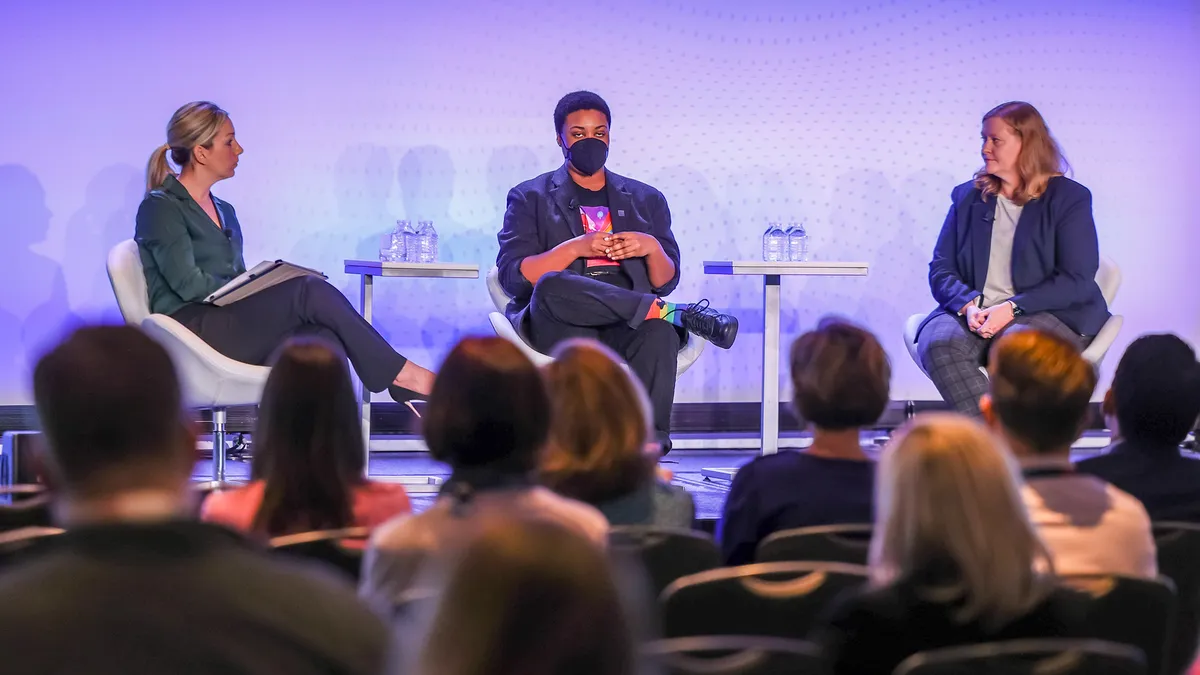WASHINGTON, D.C. — Declining mental health and intersecting traumas were front and center at the Business Group on Health’s session on LGBTQ+ benefits. Raina Nelson, the Human Rights Campaign’s Workplace Equality Program senior health manager, and Alethea Varra, Lyra Health’s senior vice president of clinical care, came together to discuss how health disparities disproportionately affect LGBTQ+ talent.
The issue is twofold. First, Nelson and Varra addressed the increasingly hostile environment toward gay and trans individuals, fueled by a slew of anti-LGBTQ+ legislation. The “outsized ramping up” of attacks on the community has a direct effect on queer mental health, Nelson explained.
Then there are the tangible manifestations of bias that have real-world effects on LGBTQ+ well-being, including poverty, un- and under-employment, homelessness, intimate partner violence and police violence. For context, transgender workers are twice as likely to be unemployed, McKinsey and Co. reported in 2021; the same analysis noted cisgender employees make 32% more than trans employees, even when trans talent have the same or more education under their belt.
As the moderator underscored, gay and trans talent do not necessarily have to be the direct recipients of hate crimes or overt discrimination to feel the draining effects of homophobic and transphobic sentiment.
Panelists spoke on the difference, as well, between culturally competent care and culturally responsive care. The moderator also highlighted a possible assumption by benefits professionals: “Having culturally competent care means you’ve made it to care in the first place.”
Varra explained that cultural responsiveness in healthcare looks like being more active in terms of impact. Healthcare workers are more “intentional” and “purposeful” in how they value patients’ identities, and subsequently, in integrating and adapting that mindfulness into care.
For example, healthcare providers can be mindful of pronouns and gender identity. Additionally (while being mindful of healthcare law compliance, the speakers added), benefits professionals can seek out ways to incorporate chosen family into offerings.
Employers today can take action for the community by bringing LGBTQ+-focused benefits to the fore. Make these offerings “explicitly clear” in company benefits portals and pamphlets, Nelson encouraged, at open enrollment and upon hiring.
Throughout the discussion, Nelson highlighted the importance of access and visibility; as a senior manager at the Human Rights Campaign, naturally, Nelson highlighted the Corporate Equality Index.
The 2022 Corporate Equality Index report named hospitality companies Caesars Entertainment, Choice Hotels International, Hilton, Hyatt Hotels Corporation, IGH Hotels & Resorts, Kimpton Hotel & Restaurant Group, Marriott International, MGM Resorts International and Wyndham Hotels & Resorts among the Best Place to Work for LGBTQ+.
The top-rated Corporate Equality Index employers took concrete steps to establish and implement comprehensive policies, benefits and practices that ensure greater equity for LGBTQ+ workers and their families.
It’s worth noting that, per McKinsey’s data, about two-thirds of trans employees are not comfortable disclosing their gender identity in the workplace. Trans respondents to McKinsey’s survey also reported that it is more difficult to understand workplace culture and benefits. In the Business Group on Health’s session, Nelson told the crowd that being proactive about highlighting inclusive benefits will help LGBTQ+ workers access the care they need — without having to out themselves.












